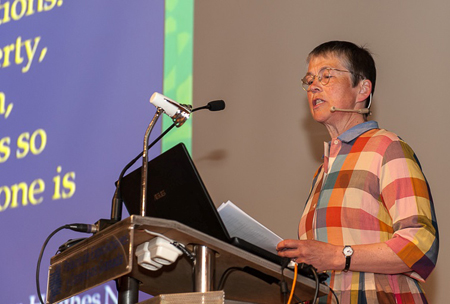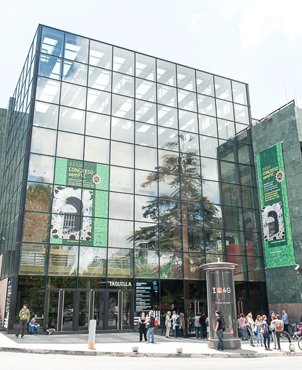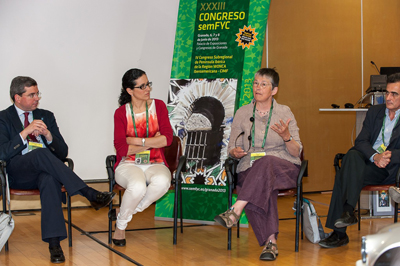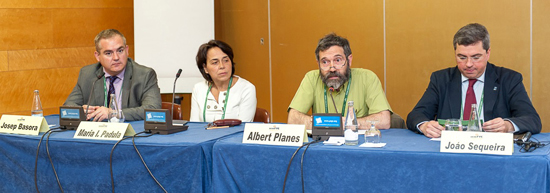XXXIII Spanish Society of Family and Community Medicine (SemFYC) Conference

español .pdf
Iona Heath warns of the consequences of austerity for health in the XXXIII Spanish Society of Family and Community Medicine (SemFYC) Conference
This prestigious doctor gave an opening speech on '
Medicine in times of austerity'. As more are impoverished, there is more sickness. This was one of the key messages left by Iona Heath in her speech Medicine in times of austerity, with which she opened the XXXIII semFYC Conference, held in Granada, last June. Heath is one of the most influential researchers in primary care, former president of the Royal College of General Practitioners (UK), and former member of the Executive Committee of WONCA.
Heath wanted to make clear that austerity is generating inequality and "it is at the root of many social problems." The end of the consequences of this inequality we find it precisely on health, as Heath said: "the lives lost will not return when markets recover." This prestigious family physician reviewed data and quotes from recognized professionals, the impoverishing effects of austerity, its biological effects, the pressure and burden on the family doctor and the commercial exploitation of health issues. Finally, she gave some options and alternatives to the difficult times we are living.
The attendees enjoyed the opening speech of the XXXIII semFYC Conference. Heath insisted that "the medicine needs a broader approach that allows us to reveal the causes of the disease" and recalled that "good professionals should ask their patients about their experiences," although this does not appear in any clinical book. Sharing these experiences with governments and society maybe will make possible a reaction.
You can see the presentation that Heath used during the keynote, with her own comments, by clicking the following link, and read the interview conducted from the Blog of the XXXIII semFYC Conference.
(
Link to the complete presentation)
Summary of congress SemFYC XXXIII

The semFYC XXXIII Congress was held last June in the city of Granada. 2,545 doctors attended the Congress, of which 698 were family medicine residents (27.4 %). In addition to direct ‘in person’ participation at the conference, there was significant distance participation, primarily through the
blog made specifically for the Congress, and social media. A total of 14,000 visits to the
blog (11,000 views before the Congress and 3,000 visits during the Congress) were received. The Facebook page regularly received about 1,000 daily visits, reaching peaks of 3,000 views, and with an average of 200 followers. Likewise Twitter account reached 300 followers in a few weeks, with more than 1,000 tweets generated, 200 active participants, 70,000 people in the audience precongresual phase, 100,000 people in the congressional hearing phase. The total expansion during the Congress was half a million people.
It was the Congress in the history of semFYC with the highest number of scientific abstracts received (2,288) and the highest number of accepted scientific abstracts (1,723 - 75%), which also included first abstracts on clinical cases.
About seven streams were provided (Enhancing the resolution capability of the family doctor; medication management in times of crisis; Things about which we always ask "What can I do now?”; Neurological diseases; and emergency care and a specific program for Young GPs). With them there was a space for Updates and semFYC Working Groups and also an important number of parallel activities: Classroom Teaching, Research Forum, Activity of Programs and Sections of semFYC, A Workshop in Health Communication, Preventive Activities Program Forum, Updating in Family Medicine Forum and a Solidarity semFYC Space.
Together with the Congress, important parallel Congresses were held. Among them, the IV Iberian Congress Subregional WONCA Region Ibero - CIMF and also the IV semFYC in Cardiovascular Clinical Congress, the XV Meeting Community Activities Program in Primary Care (PACAP) or the Forum on Health Education Food and Nutrition.
The inaugural speech with the title "
Family Medicine in times of crisis”, was delivered by Dr Iona Heath, who at the time, was President of the Royal College of General Practitioners and a member of WONCA World Executive. Dr Heath had the courtesy to also participate in a meeting with medical students, residents and young physician family members from Vasco de Gama Movement.
The two Fora in the Subregional WONCA-CIMF Congress addressed two field analysis: in first place, "Family medicine, more than ever", a view of the international situation with the participation of the President of CIMF, Inez Padula, the President of the Portuguese Association of General and Family Medicine, Joao Sequeira and the President of semFYC, Josep Basora. The second panel made an Overview on the practice of the family doctor with the participation of three family physicians with caring responsibilities: Virginia Hernández Santiago (in United Kingdom), Tiago Villanueva (in Portugal) and Salvador Casado (in Spain).
Vasco da Gama Movement invites Young Family Medicine Physicians and residents to get involved in Europe
The group held a roundtable in the XXXIII SemFYC Conference to explain their new challenges
The international representative Vasco da Gama Movement (VdGM) of Spain, Raquel Gómez Bravo, was in charge of presenting the roundtable on this group of WONCA Europe: the Youth Organization of Family Physicians and Residents. Gómez Bravo explained the diversity of work areas within the VdGM and invited people into it. She emphasized the effort that was being done in the dissemination and social networking activity, as well as professional and personal wealth that provides professional exchanges through Hippokrattes program.
Karen Adriana, VdGM international representative of Spain, made her presentation on preconferences that are performed before each WONCA World Congress. She insisted that it is about sharing experiences and draw positives from workshops, in which they struggle with people from different countries about their experiences, after preparing some different issues about them. The goal is “to think globally and to act locally." Meanwhile, Veronica Parent, a member of VdGM Spain, reviewed her different experiences via exchange Hippocrates program and summarized: "The idea comes from Hippocrates program: you're making a difference to the place where you go and this brings something to you." Parent explained how to apply to a Hippocrates program and her professional and personal experience. In the same vein intervened Catherine Tarazone Belisa, who explained her exchange experience in the UK Royal College Conference and insisted that this type of program provides some extraordinary personal experiences.
Support from semFYC
Gómez Bravo wanted to take the opportunity to thank the support from semFYC to VdGM and cited this conference attendance from residents of other countries. In question time the roundtable responded various doubts from the attendees. For example, in front of the problems for carrying out the exchange program in specific regions, since they have different operation, the member of the Executive Board of semFYC, Pascual Solanas, proposed to take this issue through semFYC to the National Commission specialty for a method or certificate providing criteria to join or at least overcome these bureaucratic barriers more easily. There were also tutors of residents in the room that asked for their own VdGM exchange, although this has not been yet contemplate it from the VdGM. The head of the International Section of semFYC, José Miguel Bueno announced that he is already in contact with other scientific societies to carry out exchanges of tutors in the future.

Dr. J. Sequeira, Dr. Gómez Bravo, Dr. I. Heath and Dr. S. Minué during a meeting.
A conference roundtable compares the situation of the family doctor in Spain, the UK and Portugal
Three GPs were responsible for exposing the different situations in Spain, UK and Portugal during one of the meetings of the Sub-Regional IV Iberian Conference of the Iberoamerican WONCA Region.
The economic crisis affects all of Europe but the specialist status of Family and Community Medicine is different depending on the country and its health system. One of the roundtables in the Sub-Regional IV Iberian Conference of the Iberoamerican WONCA Region held in Granada together with the XXXIII SemFYC Conference, compared the situation in Spain, the UK and Portugal through the exposures of three speakers. The first speaker was Virginia Hernandez family physician in the UK, where the system has some similarities with the Spanish, such as the primary care level solves 90% of health problems. To find the big differences you have to understand the management of health centres that work "as a mini-business." That is, "the government does not hire family physicians, so do the partnerships, family physicians responsible and / or founders of the health centre." Therefore, there "the family doctor is a self contained" but "they have part of their research hours assigned, minor surgery, teaching... as they choose". As great advantages to the Spanish system, the specialist in Family and Community Medicine in the UK "serves patients of all ages, there is a good relationship with the specialist, flexibility, great importance is given to training...". But instead, "they have more bureaucracy than in Spain" and "doctor-patient relationship is very weak", because it is assigned a family physician for each patient, so it is no longitudinal. After this comparison, Hernandez explained that the recent health care reform passed by the UK Prime Minister, David Cameron, "will destroy 2,500 jobs."
Tiago Villanueva, from the Portuguese Society of Family Medicine, was commissioned to draw the scene in Portugal, where he warned that “the big difference with Spain is that when you finish the residence, you will have virtually guaranteed a permanent position." Although, the thing that most surprised those present in the room in the end was that the Portuguese system of family doctors have approximately 2,000 patients per doctor and 20 minutes per visit, and also attend to pregnant women and children. But obviously there are also certain disadvantages compared to the Spanish system: for example, there is more bureaucracy, more limited use of some techniques in consultation and an assessment of the specialty very low, because the general impression is that anyone can do it.
After learning a little more about systems in the UK and Portugal compared with Spain, Salvador Casado was instructed to put on the table the current situation of the family doctor in Spain. For Casado, the specialist of Family and Community Medicine is currently suffering "a crisis of identity and prestige", because there is an economic crisis, cuts and a precarious situation for younger specialists. But Casado did not stay to a bleak, instead, he focused on explaining the strengths that family doctors have in Spain, as "the excellent training" and "the longitudinality: we get into patient’s homes, we know their families... ". He encouraged those present to join and collaborate on all those projects that help the specialty: "we have to collaborate one with each other." In short, Casado said that "we must assert Family Medicine" even in these times of crisis, as it means a big "challenge for any physician, inside and outside the office."
 Dr. Josep Basora, Dr. Inez Padula, Dr. Albert Planes and Dr. Joao Sequeira exposing the different situations in Spain, UK and Portugal during the Sub-Regional IV Iberian Conference of the Iberoamerican WONCA Region.
Dr. Josep Basora, Dr. Inez Padula, Dr. Albert Planes and Dr. Joao Sequeira exposing the different situations in Spain, UK and Portugal during the Sub-Regional IV Iberian Conference of the Iberoamerican WONCA Region.